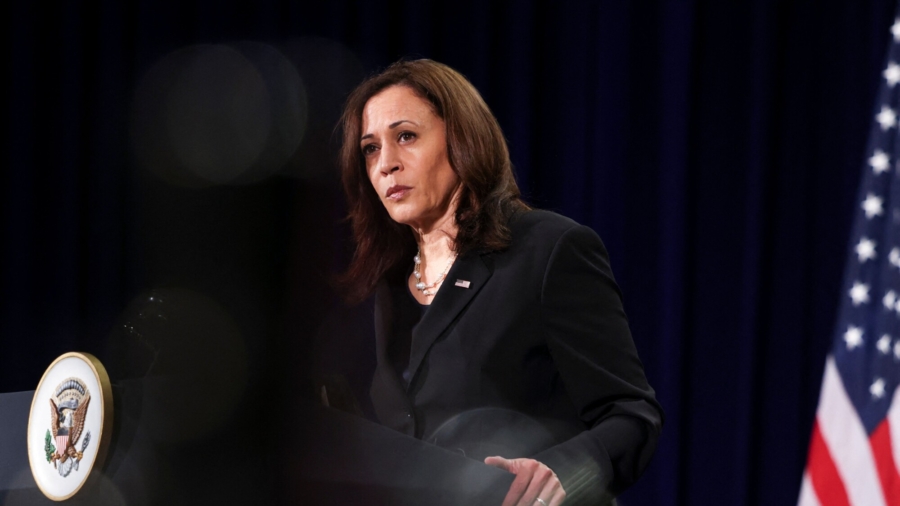U.S. Vice President Kamala Harris repeated her criticism of Beijing for undermining the rules-based international order on Aug. 26, during a press conference just hours before departing for the United States.
However, she didn’t offer details about what actions the Biden administration might take to fend off Beijing’s aggression in the South China Sea and against Taiwan.
“I believe that this trip signals the beginning of the next chapter in the relationship between the United States and Vietnam,” Harris said. She arrived in Vietnam on Tuesday evening after concluding a three-day visit to Singapore.
She said, “Throughout my visit here, I also reaffirmed the commitment that the United States has to our common vision for a free and open Indo–Pacific.”
“And we will continue to work with Vietnam to push back against threats to freedom of navigation and the rules-based international order,” she added.
Harris has been outspoken against Beijing throughout her Asia trip. Speaking in Singapore on Tuesday, she said Beijing “continues to coerce, to intimidate, and to make claims to the vast majority of the South China Sea.”
During a bilateral meeting with Vietnam’s president on Wednesday, Harris said there was a need to “raise the pressure” on Beijing and to “challenge its bullying” in the South China Sea. She also talked about upgrading bilateral ties to a “strategic partnership.”
Harris’s Asia trip—aimed at deepening ties with Singapore and Vietnam while showing the United States’ commitment to the region—has come at a time when the Chinese regime is trying to erode U.S. leadership around the world. The regime has seized on the chaotic U.S. withdrawal from Afghanistan to launch an aggressive propaganda campaign to label the United States as an unreliable ally.
China’s hawkish state-run media Global Times, in an article published on Aug. 25, said Vietnam and Singapore “are clear about” how U.S. diplomacy was about “mak[ing] allies sacrifice” for the United States.
In 2016, an arbitral tribunal ruling rejected Beijing’s territorial claims to an area demarcated by a “Nine-Dash Line.” Ignoring the ruling, Beijing has instead adopted aggressive tactics—including building military runaways and installations on islands in the disputed seas—to exert its territorial assertion.
Other aggressive tactics include denying fishermen from other countries from accessing fishing grounds in the disputed waters.
Brunei, Malaysia, the Philippines, Taiwan, and Vietnam all face territorial disputes with China in the sea.
Beijing’s aggression against Taiwan mostly involves flying Chinese military jets into Taiwan’s air defense identification zone (ADIZ). So far this month, such incursions have happened on 11 different days, most recently on Aug. 25 when an anti-submarine warfare plane entered the ADIZ, according to Taiwan’s Ministry of National Defense.
The Chinese regime has also threatened war against Taiwan and held military drills near the island.
Taiwan, a de facto independent nation, is a self-ruled democracy with its own military, constitution, and currency. However, the Chinese Communist Party sees the self-ruled island as a part of its territory that must be reunited with the mainland, by force if necessary.
“If China continues its aggression in the region, particularly in Taiwan, what is the Biden administration prepared to do differently to deter it, given that nothing seems to be working so far,” a reporter asked Harris. The reporter also asked if the administration would consider increasing its military presence in the South China Sea or slap sanctions against Chinese officials.
Harris did not comment on Taiwan, the possibility of increased U.S. military force, or possible U.S. sanctions.
“We’re going to speak up when there are actions that Beijing takes that threaten the rules-based international order,” Harris said in response to the reporter’s question.
She added, “We are going to continue to do what we can to make sure that we stay committed to our partners and allies on these important kinds of issues.”
On Aug. 4, the Biden administration approved its first arms sale to Taiwan—a package that included 40 self-propelled howitzers and 20 field artillery ammunition support vehicles. In March, U.S. Adm. Philip Davidson, the then-head of U.S. Indo–Pacific Command, said during a congressional hearing that Beijing could invade Taiwan “in the six years.”
From The Epoch Times

